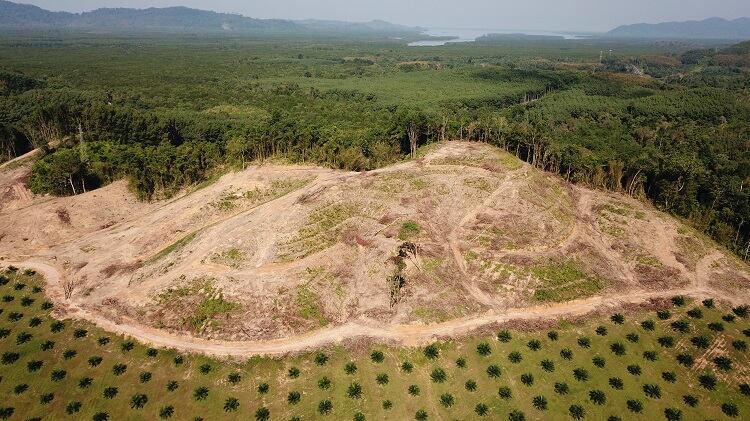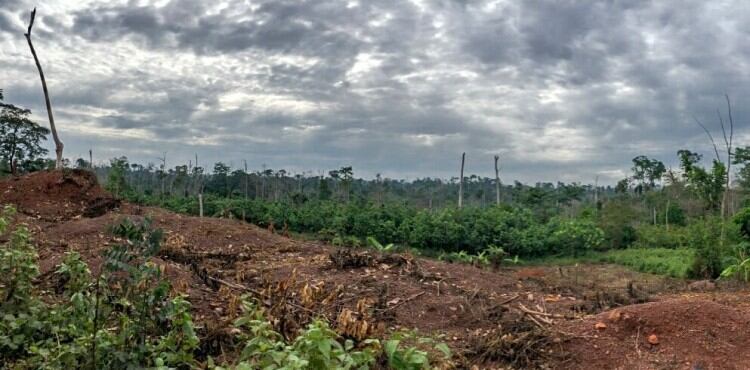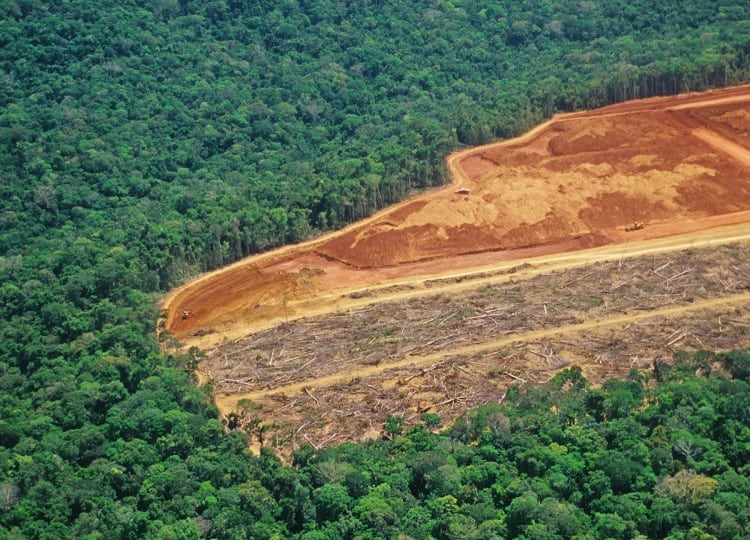Deforestation and the destruction of natural ecosystems continue to plague European food supply chains. According to NGO World Wildlife Fund (WWF), the EU is the world’s largest importers of tropical deforestation and associated emissions, second only to China.
Food and food ingredients most associated with these irresponsible sourcing methods include palm oil, soy, beef, cocoa and coffee.
In response, the European Commission is taking action. Next year, the EU will start demanding that companies importing these foods must submit due diligence reports verifying their products are deforestation free, in line with its EU Deforestation Regulation (EUDR).
And the Commission is not the only party responding: an influx of new technologies is being developed for industry. We take a look at the solutions working to boost traceability and due diligence, with the aim of eliminating environmental violations from EU food supply chains.
Monitoring deforestation with satellites, maps and data
Satellite monitoring for deforestation can be used in many ways, from sending deforestation alerts to authorities, to tracking the growth of new trees for reforestation, and helping industry monitor land use changes within their own supply chains.
Developments in satellite monitoring continue apace. Founded in 2016, Netherlands-headquartered Satelligence is working to help industry halt deforestation and comply with sustainability legislations via its proprietary satellite monitoring technology. Clients and partners include Mondelēz International, Blommer Chocolate Company, and most recently NGO Fairtrade International.
The new Satelligence-Fairtrade partnership aims to scale up satellite monitoring of forested areas and farms of the NGO’s certified cocoa and coffee producer organisations to help them comply with EUDR. In essence, producer organisations provide geolocation data for their members’ farm plots, and Satelligence’s platform can detect any deforestation activity within those plots. The technology can also raise the alarm if any deforestation is occurring near the farm, which is important when conducting cooperatives’ risk assessments.
Satelligence CEO Niels Wielaard suspects many companies are still unprepared for the ‘no deforestation’ law. However, in partnering with Fairtrade, the aim is to get all certified cocoa and coffee producer organisations on board by 2025. In that way, Fairtrade cooperatives will be ‘ahead of the curve’, he said. “It is a big taste, but it can be done. We hope that the world will invest more in smallholders, in particular in supporting those doing the right thing in vulnerable, high deforestation-risk regions.”
Other tools available to the food industry include a free tool from Brazil-based BVRio. Launched this year, the technology assesses deforestation and conversion of native vegetation at the farm level for local soy production. More than 92,000 farms are currently covered.
The technology works by quantifying and spatialising datasets available for public sources, leveraging farm location data from the Rural Environmental Registry. Soy producers can access the free tool to provide data to their buyers to demonstrate they have not cleared native vegetation in recent years.
“There is a wealth of publicly available and trusted data on land use change in Brazil, but there wasn’t an easy way to navigate it and trace soy production back to individual farms,” said BVRio director Grave Blackham. “Building on our experience in creating our Brazilian Timber Due Diligence system and driven by the increasing demand for agricultural commodity traceability due to regulation tightening, we created this new soy production map and tool.”
Simplifying sustainability measuring and reporting
For industry, submitting due diligence reports verifying their products have been produced with sustainably sourced ingredients adds an extra layer of complexity to current administration requirements.
Here in lies an opportunity for technology suppliers to ease the workload on sustainability measurement and reporting. A new digital platform funded by agribusiness majors Archer Daniels Midland Company, Louis Dreyfus Company and Olam has been developed to enable a common method for measuring, aggregating, and comparing data across supply chains and more than one product category.
Coined TRACT, the platform will begin with a focus on sustainability insights related to carbon emissions and, in the future, expand to allow for metrics on deforestation, child labour risk, forced labour risk and living income. Supply chains currently being covered include coffee and palm oil, with soy, cocoa and cotton on the horizon.
“This is new and we believe it will be transformative for the sector,” TRACT CSO Tom Oldfield told FoodNavigator’s sister publication FeedNavigator. “And it is the first time that the industry has come together – a pre-competitive collaboration – to develop an impactful solution for this industry-wide issue.”
Another technological development working to ensure transparent, traceable supply chains, comes from a collaboration between ICE Benchmark Administration Limited (IBA) and data solutions-focused Meridia. The result is the ICE Commodity Traceability Service (CoT) for suppliers of cocoa, coffee and sugar.
In essence, the ICE CoT is designed to automate the process of submitting, storing and validating the information for operators and traders to ensure and demonstrate complicate with the EUDR. The service is expected to launch next year.
“Customers can register and validate parcels of beans and products in ICE CoT, which can be maintained and tracked as they are traded, divided, and processed along the supply chain,” explained IBA president Clive de Ruig. “ICE CoT will provide continuous and independent validation of the traceability data from the initial parcel to its ultimate use or export, giving confidence to operators and traders of the quality and compliance of the data underlying the product.”
‘Digital transformation’ for palm oil regulatory compliance
The palm oil sector is amongst the most associated with deforestation in tropical climates. Indeed, production of the widely used ingredients – estimated to be an ingredient in around half of all products in the supermarket (both food and non-food) – continues to be a leading cause of deforestation and biodiversity loss.
Certification body the Roundtable on Sustainable Palm Oil (RSPO) is working to stamp out deforestation from palm oil supply chains, and wants to help its members comply with the EUDR.
Previously, RSPO used a traceability platform called PalmTrace to track certified palm oil volumes. Now, the organisation is announcing PalmTrace will be replaced by a ‘unified and optimised’ system that integrates the certification, trade and traceability components into one end-to-end system for RSPO stakeholders.
The ‘digital transformation’ will be spearheaded by Singapore-based Agridence, along with other agritech players CIED and NGIS. Together, the consortium aims to streamline and enhance the user experience for RSPO members, while at the same time guide and transition users towards regulatory compliance.
“The new platform will support RSPO Members (operators and traders) in providing information which is necessary for the due diligence statement required by the European Commission in line with the EUDR by 29 December 2024,” noted RSPO.





